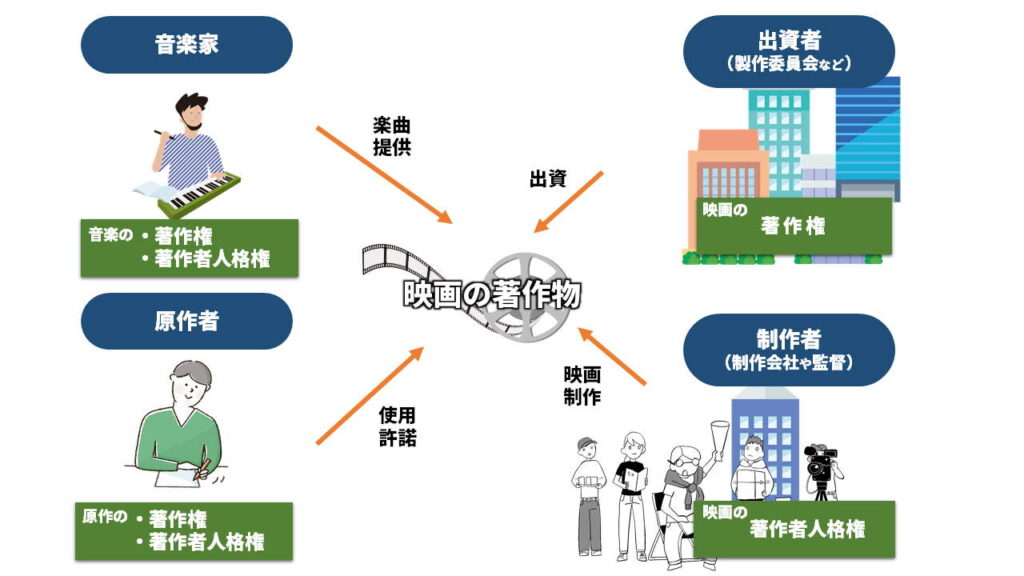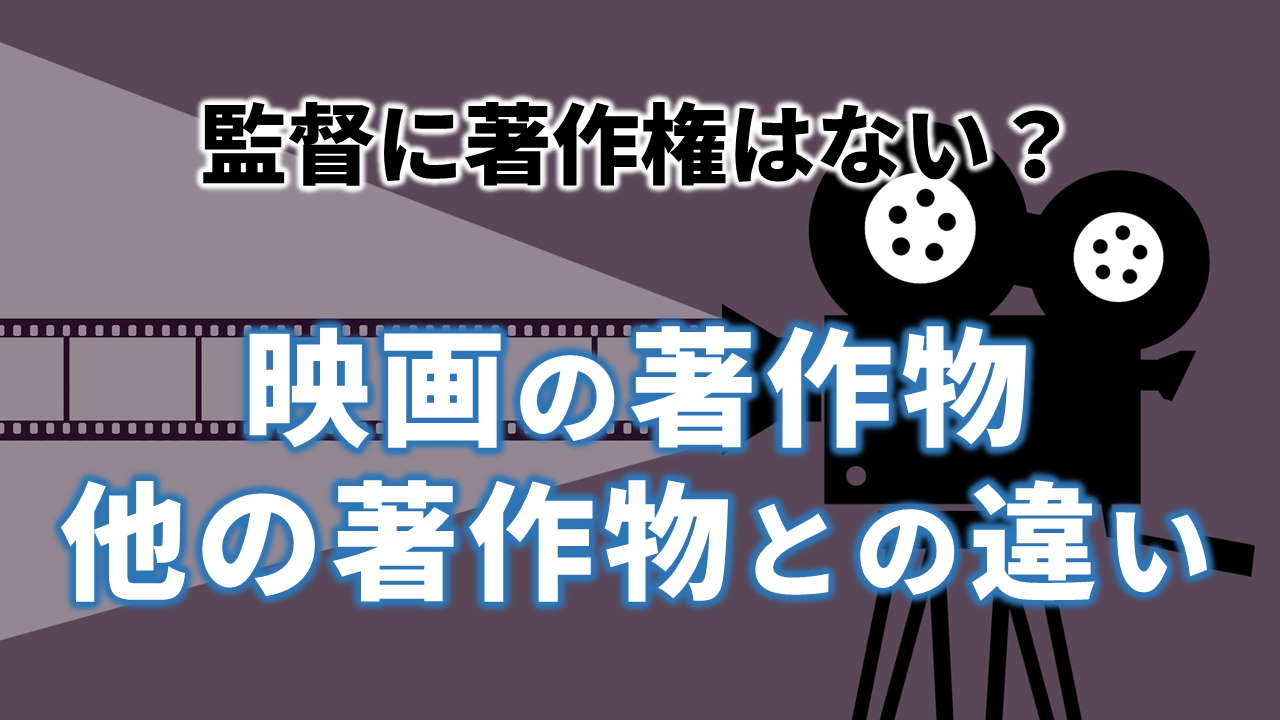Recently, I’ve been watching news of the crackdown on “fast movies” a lot.
In addition, the copyright of the movie area is attracting attention, such as news that Director Takeshi Kitano is in dispute with Bandai over the copyright of the film he directed.
Unlike other works, there are various special circumstances regarding film copyrighted works, and I think that special circumstances are obstacles to reading such news.
So this time, I would like to explain mainly the differences between film works and other works.
Scope of “Film Works”
Before we get into the main topic, make sure that what the “work of the movie” includes in the first place.
Theatrical movies
TV dramas
Net distribution video
Video software
Game software
Commercial film
Such as
In addition to what is commonly called “movies”, such as theatrical films, so-called “video works” are included in “movies” under the Copyright Act.
Surprisingly, “game software” is also included in the work of the movie.
As a case study, “Sangokushi III” may not be included in the film’s work, so it is controversial whether all game software is classified as a film work, but in general it is better to interpret that most game software is included in the work of the movie.
The author and author of the film

The most different part of a film from other works is that “the author and the copyright holder are separated in the early stages.”
“Author” and “Copyright holder” have similar words but different meanings.
“Author” = the person who created the work
“Copyright holder” = the person who owns the copyright (person who can exercise the right of the work)
It is.
As for copyright, the author may not be the copyright holder because of the transferable right to others, but the author owns the copyright as the moment the work is born.
But in the case of movies, that’s not always the case.
The author “right” is a funder of the production committee, etc.
The film is made by collaborating with a wide variety of creators, including directors, costumes, art, photographers, sound engineers, and video editors. (Except for individual productions that all great creators do by them themself)
However, the “rights” of the work are mostly attributed to the funders (mainly “production committees” consisting of multiple companies) who have suffered the cost of producing the film and other economic risks.
At first glance, it sounds like only creators are hurting, but if a movie is koke, it’s the investors who will lose a lot of money, so if you stand by the idea that there should be a return on the investor who is taking more risks, you’ll be convinced.
Therefore, it is not the creators who actually made the movie, but the investors who have the right to issue permission for businesses using movies, such as sales of goods, TV broadcasting, and online distribution, and of course, the person who will enter the store will also be the investor.
On the other hand, there is no right to creators who actually made movies, such as directors, because they are not, and they are unmistakable “author”, so it remains that “moral rights of author” cannot be transferred.
* Aling the fact seems to be that the copyright law defines “the person who is responsible for the production of the work of the movie” as the copyright holder of the movie, and it should be added that it is vague who is the primitive copyright holder only by the interpretation of the law.
Therefore, if there is an unwanted modification, etc., the act can be stopped on the basis of the right to maintain the sameness.
In addition, it is not uncommon for a production company to belong to a production committee, which has a part of the copyright and ensures a solid return if the film succeeds.
For example, the production committee of “Devil’s Blade” is three companies: Aniplex, Syueisha, and ufotable, an anime production company, and the return following the hit work seems to have been returned to ufotable.
Exceptions to musicians and original artists who provided music
As for the original author, musician, and (in some cases, the screenwriter), it is called “Classical Author”, and the copyright does not go to the sponsor etc. exceptionally for the work they provided to the movie.
Considering situations such as making existing novels and manga into movies and making existing songs the theme song of movies, it is unacceptable to see that the copyright has been passed to the film company once the film is produced, and the intention of this measure is easy to understand.
However, there is a sense of incongruity and good or bad that music composed exclusively for movies and screenplays written exclusively for movies are treated like that.
The case that becomes a problem because the production committee does not hold the copyright is when the sales method and the usage method that the original author and the musician did not grant at the time of the movie production occur, such as when the movie made at the time when the net was not yet prospering is distributed on the Net.
In such a case, you can stop the act against the background of the copyright of the original and music owned by “Classical Author”.
This is a very strong right, and without the permission of “Classical Author”, businesses such as production committees will be virtually impossible to develop.
It is a story on the desk, but it is rare to actually get into trouble, and there is a certain amount of fee regulations between the business associations, and by paying the fee to the screenwriter and the musician, it seems that it is generally licensed to use it.
The start of calculating the protection period is not after the death of the author, but after publication
Another exception is how the protection period is calculated.
What is a protection period?
The period of protection (period of protection) for a work protected by copyright law is limited, and is basically 70 years after the death of the author (author).
At the end of the protection period, the “public domain” means that everyone is free to use the work without copyright restrictions.
You may have heard that classical music can be used freely as background music, but this is because most classical songs have been in the “public domain” for more than 70 years since the composer’s death.
70 years after the release of the film, not “after the death of the author”
When it comes to movies, there is also an exceptional treatment of the duration of protection.
Most of the works are basically 70 years after the author’s death, whereas for a film work, it is 70 years since it was published.
The publication of a work is “when the work is presented to the public by means such as performance, performance, screening, etc. with the permission of the copyright holder”.
In the case of a movie, it is better to think of it as the first screening for the audience.
Summary
I explained the differences between the works of the film and other works.
I hope it will be helpful in reading news, etc.
Thank you for reading this far.
* The information described is current at the time of posting the article and is subject to change in the future.




コメント